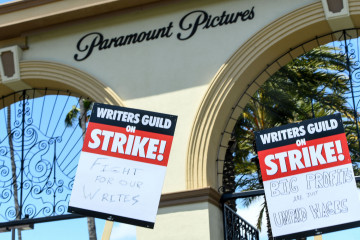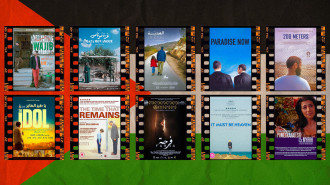
'They are choosing profit over humanity': Hollywood writers of Middle Eastern heritage talk about why they're on strike

As a son of Lebanese immigrants in Ohio, George V. Ghanem grew up watching Hollywood movies with his mom as she learned English, and he also wrote scripts that he dreamed of turning into his own productions.
Now based in southern California with several hit TV shows under his belt, he says that through the Hollywood writers' strike, now in its second month, he is fighting for the survival of the industry he loves.
"We're fighting for the future of this industry," Ghanem tells The New Arab. "Everyone is doing as much as they can. We're in solidarity with each other. No one can work in the meantime."
New technology, old disputes
The future of the quickly-changing industry, which has brought the parties to a standstill, is digital. These days, this means acclimating to the realities of streaming and artificial intelligence, both of which have effects on the structure of the industry, including writers' pay.
The surge in streaming has coincided with writers' pay cuts and smaller staff, along with shorter TV show seasons, despite record profits for the studios. Strikers are asking for guarantees of residuals for streaming, larger writers' rooms and prevention from their original work to be used for artificial intelligence.
"We don't want our scripts generated by AI. We want protections from our own scripts being fed into AI"
"This is one of the big things we're negotiating. We don't want our scripts generated by AI. We want protections from our own scripts being fed into AI," says Ghanem.
AI has been compared with past shifts in technology, including 15 years ago, when the last writers' strike took place, with the shift toward streaming, now the norm for entertainment consumption.
|
Those leading the strike are around 11,500 writers represented by the Writers Guild of America, who are going up against the major studios: Amazon, Apple, Disney, Warner Bros. Discovery, NBC Universal, Netflix, Paramount and Sony, represented by Alliance of Motion Picture and Television Producers.
Solidarity among the underrepresented
The strike, which started at 12:01 am on 2 May, the day after the WGA contract expired, has united a stratum of American society — bringing together young and old, gay and straight, and writers from different cultural backgrounds, as they take turns standing on the picket lines in front of the major Hollywood studios.
"The pickets are supported by committees from the queer, black, Latinx, and Native communities. Being Middle Eastern myself, I'm really passionate about our lack of representation. I want to show solidarity with other underrepresented groups"
"It's truly been amazing, but bad news for powers that be," Mano Agapion, a comedy writer and vice chair of the Middle Eastern Writers Committee," tells The New Arab.
"It's making us stronger. Getting us to connect with other writers has made us more resolute," says Agapion, who is gay and whose background is Palestinian, Syrian and Greek. "The pickets are supported by committees from the queer, black, Latinx, and Native communities. Being Middle Eastern myself, I'm really passionate about our lack of representation. I want to show solidarity with other underrepresented groups."
The Middle Eastern Writers Committee, established in 2020, aims to generate inclusiveness for an underrepresented group, accounting for around 0.3 percent of Hollywood screenwriters, and to try to counter negative depictions of Middle Easterners in entertainment.
"The last thing we need is more stories about rich white men. Sorry, Succession," says Agapion, referring the hit series about a family company dynasty. "Pop culture is viewed through the lens of whiteness. Why not a duplicitous oil family from Dubai?"
He says he tends to tell outsider or underdog stories, something he identified with as a gay Arab growing up in North Carolina. For his part, Ghanem has worked to portrayals of the Middle East, including a taxi scene in Beirut, as realistic as possible.
International solidarity amid divisive tactics
At the beginning of this month, writers' unions across the world announced they would be joining them, vowing they will not cross the digital picket lines by writing for Hollywood studios, with a demonstration planned in London's Leicester Square on the 14th. There will be similar actions in at least 20 countries across the world, including Buenos Aires, Cologne, Paris, and Seoul.
“On this Global Day of Solidarity, I would like to join my fellow union members in the UK in sending this message to screenwriters across the Atlantic – we hear you, we support you and we stand with you," Sandi Toksvig, president of the Writers Guild of Great Britain said in a public statement issued on the eve of the Global Day of Solidarity.
"We understand that these are difficult times and that many writers are in need of work but we are advising our members not to work on projects in the jurisdiction of the WGA for the duration of the strike following a motion of solidarity passed by our lay governing body," the Writers Guild of Great Britain wrote in a public statement, following the outbreak of the WGA strike.
This show of solidarity comes just as the Directors Guild of America has struck a deal with the Alliance of Motion Picture and Television Producers, described by many observers as a divide-and-conquer tactic by the studio heads. A similar strategy was used in the 2007-2008 strike, which so far has not worked during this ongoing strike.
Beyond just business for the strikers
For many of the striking writers, their picketing goes far beyond their demands for higher pay and more job security. Many see themselves as part of a global movement that is fighting for the rights of creative workers and the middle class amid a collusion of overpaid executives who lack the artistic skills to write scripts but who hold the financial power.
"They're choosing profit over humanity. The people who ran the studios used to be art lovers. Now, it's corporate people and numbers people. It was allowed to change, and now we have to protect ourselves. It's been gradual, and it's tough"
"As a creative, it's a very interesting time to be sticking with your guns. I'm incredibly proud to be part of the WGA to support the future of our careers," says Agapion. "I think it's part of a bigger labour movement. The middle class is disappearing. As writers, we're no different."
Ghanem says, "They're choosing profit over humanity. The people who ran the studios used to be art lovers. Now, it's corporate people and numbers of people. It was allowed to change, and now we have to protect ourselves. It's been gradual, and it's tough."
|
Vincent Mosco, professor emeritus of sociology at Queen's University in Canada, who left the US following the re-election of former President Ronald Reagan after his mass firing of the striking air traffic controllers, tells TNA that he is impressed by the worker mobilisation he is seeing among the younger generations.
"There's a satisfaction I have today that the younger generation is starting to mobilise and fight back," says Mosco. "For the short term, the writers have the club of creativity. As long as you have that, you can retain control. The producers think they can squeeze the product out of them for the least pay."
As AI has become increasingly widespread in daily life, threatening to replace writers, Ghanem has thought about how it could also replace studio executives.
"I keep on thinking about all of this AI stuff and executives thinking they can't be replaced," he says. "The idea that they think they're immune is preposterous. They're figuring out what's going to make a profit. They have AI for that already."
Brooke Anderson is The New Arab's Washington, DC correspondent. She spent five years in Damascus, where she studied Arabic and worked as a journalist and eight years in Beirut, where she mainly worked as a journalist. She has won awards for writing about police brutality in the US and Syrian refugees in Lebanon.
Follow her on Twitter: @Brookethenews


